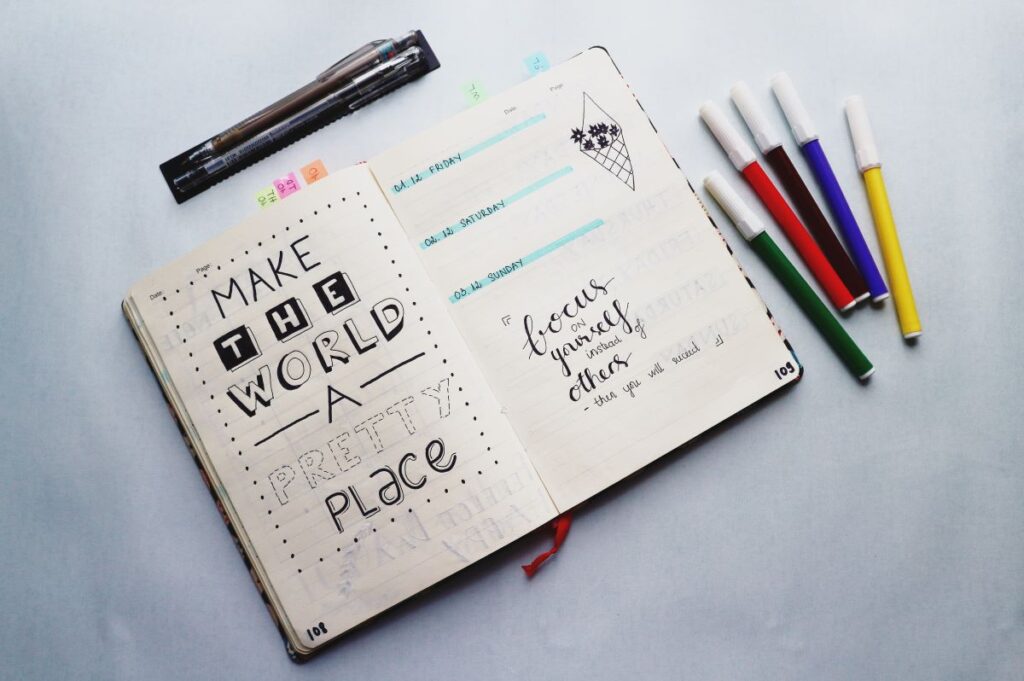Ever find yourself struggling to stick to your goals when starting a new habit? Having trouble getting organized or staying motivated? Many people face challenges when it comes to creating and maintaining healthy habits. Do you know there’s a powerful tool that can help you stay on track and transform your life? Welcome- the habit tracker! Yes, it’s a thing, a BIG thing! I started using habit tracking tools to be more intentional when incorporating new behaviors, and it has changed my life! I know these 21 habit tracker ideas will be a game changer for you too!
21 Life-Changing Habit Tracker Ideas
Here are 21 powerful habit tracking ideas to manifest the life of your dreams!
1. Start with a Single Habit
Begin by tracking just one habit to avoid overwhelming yourself. Once it becomes second nature, add another to stack your habits and gain momentum.
2. Focus on Keystone Habits
Identify keystone habits—small actions that have a positive domino effect on other areas of your life. For example, exercising regularly can boost your energy levels and improve your overall well-being.
3. Track Gratitude
Dedicate a section of your habit tracker to jotting down things you’re grateful for each day. This practice cultivates positivity and changes your mindset.
4. Create a Morning Routine
Track your morning routine to establish a positive tone for the day. Include activities like meditation, journaling, or exercise.
5. Prioritize Self-Care

Allocate time for self-care activities, such as reading, getting enough sleep or engaging in a hobby. Track these moments to ensure you prioritize your well-being.
6. Monitor Water Intake
Staying hydrated is crucial for your health. Track your daily water intake to make sure you’re meeting your hydration goals.
7. Break Bad Habits
Use your habit tracker to monitor and break unhealthy habits, such as excessive screen time or late-night snacking.
8. Incorporate Mindfulness
Track your mindfulness practice, whether it’s through meditation, deep breathing exercises, or mindful eating.
9. Read More
Set a reading goal and track the number of books you read each month. Make time for personal growth and relaxation.
10. Daily Movement
Keep track of your physical activity, whether it’s a micro workout, a yoga session, or a walk in the park.
11. Learn Something New
Dedicate time each day or week to learn a new skill or broaden your knowledge. Track your progress and celebrate your achievements.
12. Financial Habits
Monitor your spending habits, savings goals, or debt repayments. Use your habit tracker to foster financial discipline and reach financial goals.
13. Practice Compassion
Track daily acts of kindness or expressions of gratitude. This can help you cultivate a more positive and compassionate mindset.
14. Social Connections
Set goals for maintaining and nurturing relationships. Track the frequency of calls, meetups, or acts of kindness towards loved ones.
15. Digital Detox

Allocate screen-free time in your day and track the duration. Disconnecting from technology can improve your mental well-being.
16. Meal Planning
Create a habit of meal planning and track your adherence to it. This can help you eat healthier and save time.
17. Improve Sleep Habits
Track your sleep schedule and establish a bedtime routine. This will optimize your rest and energy levels.
18. Mindful Eating
Monitor your eating habits and pay attention to portion sizes and food choices. This can contribute to a healthier lifestyle.
19. Reduce Stress
Track stress management techniques such as deep breathing exercises, meditation, or engaging in hobbies that relax you.
20. Create a Nighttime Routine
Incorporate nightly routines including self care and preparation for the next day can help you get a better night sleep and reduce anxiety the next day.
21. Reflect and Evaluate
Regularly review your habit tracker to reflect on your progress, identify areas for improvement, and celebrate your achievements. Use a journal to track your moods and reflect on your feelings.
What is a Habit Tracker?

A habit tracker is a tool designed to help you monitor and visualize your habits. It provides a simple and effective way to record your progress, identify patterns, and stay accountable to your goals. Whether you want to establish a daily exercise routine, read more books, or meditate regularly, a habit tracker can be your ally on your self-improvement journey.
Benefits of a Habit Tracker
Research has shown that those who use habit trackers are more intentional and are able to reinforce positive behaviors, which leads to behavior change over time. Here is a list of how using a habit tracker can benefit you today and in the long run.
- Visualize Progress: Habit trackers provide a visual representation of your progress, which can be incredibly motivating. Seeing the streaks and checkmarks grow can boost your confidence and encourage you to keep going.
- Maintain Accountability: By tracking your habits, you create a sense of accountability. You become more aware of your actions and feel compelled to stick to your commitments, knowing that you’ll have to mark them as completed.
- Identify Patterns: Habit trackers allow you to spot patterns and correlations between different habits. You can uncover triggers or factors that influence your behaviors, making it easier to modify or eliminate them.
- Set Realistic Goals: Habit trackers help you set realistic goals by breaking them down into smaller, actionable steps. You can track your progress on a daily, weekly, or monthly basis and make adjustments accordingly.
- Celebrate Achievements: When you achieve a milestone or complete a habit streak, habit trackers give you the opportunity to celebrate your accomplishments. This positive reinforcement encourages you to continue striving for more.
Remember, a habit tracker is a tool to assist you in creating positive change in your life. Customize it to suit your needs, experiment with different approaches, and be patient with yourself as you develop new habits. Consistency, self-awareness, and a growth mindset will ultimately lead to transformative results.
Different Kinds of Habit Trackers

Habit trackers come in various forms, from digital apps and websites to good old-fashioned pen and paper. Here are three popular types of habit trackers. Use the one that’s right for you.
Digital Habit Trackers
These are smartphone applications and web-based tools that offer a range of features, such as automated tracking, reminders, and progress analytics. Examples include Habitify, Loop Habit, and HabitShare.
Bullet Journals
If you prefer a more tangible and customizable approach, bullet journals are an excellent choice if you’re a creative person. With a blank notebook and some creativity, you can design your own habit tracker spreads using various symbols, colors, and layouts. Try a “dot journal” and have some fun with it!
Weekly Habit Tracker Calendars
I love using weekly habit tracking calendars. I can visually see each day of the week and write down my goals and check them off as they are completed daily. This is a great way for you to organize your week and be intentional about your habits at the same time.
Get Better Everyday
Now that you have these amazing habit tracker ideas, what are you waiting for? Start using a habit tracker today to provide structure, accountability, and visualization to help develop and maintain positive habits. By implementing these 21 life-changing ideas into your habit tracker, you’ll be well on your way to transforming your life and achieving your goals. So, grab your habit tracker of choice and embark on a journey of self-improvement and personal growth. Your future self will thank you for it!
Resources
If you’re looking for additional resources to enhance your habit tracking journey, here are some valuable references:
- Atomic Habits by James Clear: This book provides actionable strategies for building good habits, breaking bad ones, and implementing effective habit-tracking techniques.
- Tiny Habits by BJ Fogg: BJ Fogg introduces the concept of “tiny habits” and shares practical methods for creating sustainable behavior change through habit tracking.
- “The Science of Successful Habits” TEDx Marco Badwal from Harvard University talks about getting “a bit better everyday”
FAQs
How long does it take to form a new habit?
The time it takes to form a new habit can vary depending on various factors, including the complexity of the habit and individual differences. According to research, it can take anywhere from 18 to 254 days to establish a new habit, with an average of around 66 days. Remember, consistency and persistence are key to successful habit formation.
Should I track every single habit?
While it can be tempting to track every aspect of your life, it’s important to be mindful of overwhelm. Start with a few key habits that align with your goals and priorities. Over time, you can gradually add more habits to your tracker if you feel comfortable doing so.
How can habit tracking improve my productivity?
Habit tracking can improve productivity by helping you establish routines, prioritize tasks, and eliminate time-wasting habits. By tracking your daily habits and reviewing your progress, you can identify areas where you can optimize your time and focus on activities that align with your goals




